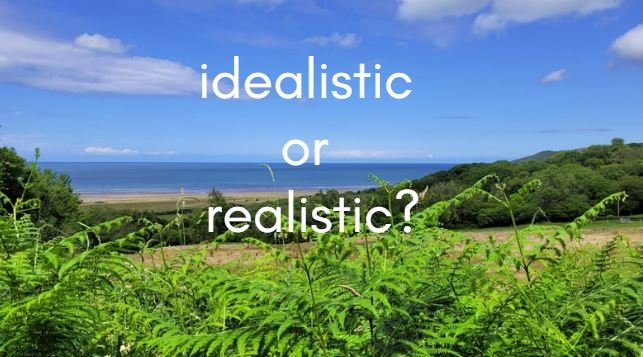“Realistic” v “Idealistic” thinking? It's time to debunk some myths
It’s time to debunk the myth that “realistic” is better informed than “idealistic” when it comes to make life and career changes.
When I was planning my career change from a senior Marketing role to working as a professional Coach I realised that I needed a bit of a career bridge – some regular part-time marketing work that would allow me the time and space to build my coaching practice and at the same time give me some financial security.
As I started my search I was told by many recruiters that “I wasn’t being realistic” in thinking that I could find what I was looking for because of the senior level I was currently employed at. My dear Dad also shared concerns that I was being “idealist” in thinking that I could make this career change happen – and that quite frankly I was slightly mad leaving a secure (and rewarding) role at the British Library.
It was an interesting time – and there was some rich learning - not least in the experience of having people who, even with the best intentions, project their own fears and beliefs onto you when you are stepping out into the unknown. Fast forward to the present day and I’ve been earning a living working full time for myself as a Leadership & Team Coach for over 6 years (and yes I did find that part-time marketing “bridge” work in case you were wondering).
I’m sharing this because something that comes up quite regularly when I’m coaching people around career change is the tug of war between what is “realistic” and what is “idealist” in terms of what might be possible in the future.
It’s curious to me how we often seem to attribute more credibility to realistic thinking, or to being realistic generally, than to thinking about what might be ideal for us. The word itself implies it – it has the word “real” embedded within it for starters! Idealists are often dismissed as overly optimistic fantasists. And yet – if we don’t allow ourselves to play with that the ideal might be (in career change – or in any area of life come to that…) we rob ourselves of the sort of spacious thinking that leads to bigger possibilities and exciting opportunities. We first have to allow ourselves to dream a little, to explore, before we then start to turn our attention to the practicalities.
So what does “realistic” thinking really mean? When people say for example – “realistically you’re never going to find a senior marketing role that you can work in on a part time basis…” it’s worth questioning where this information has come from. It might be based on one person that someone knows who tried unsuccessfully to get part-time marketing work (and as I like to say – “a survey size of one” doesn’t carry much weight) or it is likely that it will be based on second hand information or on an assumption that it’s not possible because few have previously pulled it off. And the thing about assumptions? As well as being the mother of all mess ups (polite version!) they need to be checked out for actual evidence.
So what about “idealist” thinking then? We need to explore what the ideal might be for us – because if we don’t imagine what is ideal for us we certainly aren’t going to get closer to what we want, to what lights us up. The “ideal” is where the inspiration, motivation and energy comes from – and we need that if we are going to make big changes in our life or career. There is of course a health warning that comes with the pursuit of the ideal – seeking perfection may lead to procrastination and inertia.
Never the less it’s time to debunk the myth that “realistic” is better informed than “idealistic” – because it isn’t. Maybe it’s time to move away from it being an either/or scenario - what if there was room for both? What if there was a balance to be had – some middle ground to be explored, a dance in and out of the ideal and the realistic. Nothing is fixed after all – and let’s face it – no one knows for sure what is real, true or imaginary. So next time someone says to you (or you say to yourself) “you need to be realistic” I invite you to pause, be curious, investigate your assumptions and maybe dance with the ideal for a little while – who knows what might be possible?
This was topic of an excellent webinar lead by @JohnLeesCareers @FireworkCareerCoaching
Thanks for providing the inspiration for this article.

